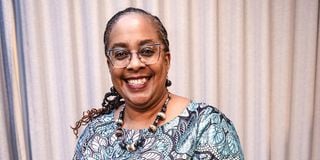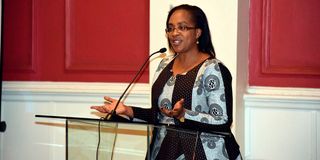How Dr Kitulu broke barriers as first Kenyan to lead World Medical Association

Dr Jacqueline Kitulu who was recently elected as the World Medical Association (WMA) President for the 2025/2026 term.
What you need to know:
- Dr Jacqueline Kitulu, known for her infectious laughter and medical leadership, rose from childhood patient to become the first Kenyan president of the World Medical Association.
- Her journey spans key roles in Kenya's healthcare system, from public service to running her private clinic for two decades.
- Now leading physicians across 115 countries, she champions interregional collaboration, mentorship, and strengthened primary healthcare systems.
Dr Jacqueline Kitulu's infectious laughter fills the phone line even before our first meeting. Her warmth and vibrancy are palpable through that initial conversation, a preview of the engaging personality I would soon encounter in person. When we finally meet at her clinic in Nairobi's Hurlingham area, her bubbling energy lights up the room, matching the cheerful demeanour that made such a striking first impression.
"I am extremely extroverted, and deeply passionate about healthcare," she declares with another hearty laugh that seems to brighten her office, where multiple awards and recognitions line the walls.
The Gen-Zs would certainly regard her as the 'cool auntie,' with her playful habit of dropping 'sheng' (Kenyan slang) into conversations. Yet behind this approachable demeanour lies a powerhouse of medical leadership.
Her day typically begins with "mouth-walking" sessions with friends, their animated conversations and laughter becoming a familiar morning soundtrack. "People often hear us laughing before they even see us," she says, describing these cherished morning walks that help her stay grounded amid her demanding schedule.
This combination of warmth and professional excellence has propelled Dr Kitulu to a historic achievement: becoming the first Kenyan and second African woman to be elected President of the World Medical Association (WMA), an organisation representing physicians across 115 countries. The WMA, established on September 17, 1947, at its First General Assembly in Paris, brings together physicians from across the globe with the mission of ensuring their independence and maintaining the highest standards of ethical behaviour and care.
Roots of leadership
Born and raised in Nairobi as the eldest of six siblings, leadership came naturally to Dr Kitulu.
"I was always the ‘Mother Goose’ - and I tend to think I still am," she laughs, reminiscing about her childhood years. This natural tendency to lead and nurture others would later become a defining characteristic of her professional life, though not without some humorous observations.
"During our initial interactions with my husband, he also always said I was such a 'headmaster,'" she recalls with another hearty laugh.

A young Dr Kitulu, then aged seven years.
Her journey into medicine began dramatically at the age of seven. A severe allergic reaction to medication landed her in the hospital, an experience that would shape her entire future.
"I remember being cared for by people who knew exactly how to make me feel better. That's when I knew — I wanted to be a doctor," she recalls, her eyes bright with the memory. From that moment, her path was set, leading her through excellence in academics and eventually to the University of Nairobi's Medical School.
Her educational journey didn't stop with her medical degree. Understanding the importance of speaking the language of policy and management, she later pursued an MBA in Healthcare Management from Strathmore University.
"As a doctor, I needed to speak another language to sit comfortably in policy spaces, so I decided to pursue an MBA," she explains, demonstrating her strategic approach to career development.
From public service to private practice
Her professional journey began in 1999 as a medical officer, followed by a position as a casualty medical officer at Nairobi Hospital in 2001. The transition to private practice came unexpectedly, shaped by both circumstance and courage. Initially devoted to public service, she found herself struggling with the limitations of the system.
"There was never enough staff, never enough equipment. I found it heart-breaking to lose babies simply because resources weren't available," she recalls with evident emotion.
The decision to leave public service wasn't easy. "I realised I couldn't stay if I wanted to give my all. But leaving the public sector left me with a lingering sense of guilt. I often thought, 'If everyone leaves, who will be there to serve?'"
Fate intervened when a distant family member who owned a small clinic - where Dr Kitulu served on locum - passed away suddenly. At just 32 years old, she faced a pivotal decision when the clinic owner's husband approached her. "Her husband approached me and said, 'You were already helping part-time; why don't you take over the clinic?'" she remembers.
"At first, it wasn't in my plan. I was actually considering going back to study anaesthesia."
Her husband's support proved crucial in this moment of uncertainty.
"He said to me, 'Sometimes life is not about the plan; it's about the opportunity that presents itself.'"
With his encouragement and a bank loan, she took the leap into private practice, despite the Nairobi Hospital CEO's scepticism. “I remember the CEO of Nairobi Hospital asked me, 'What if it doesn't work?' I told him, 'If it fails, I'll come back and work just as hard.”
Her family's support extended beyond just encouragement. "My late mother-in-law contributed to the purchase of my clinic and even officiated at its official opening," she recalls with evident gratitude, highlighting how family bonds helped shape her professional journey. Twenty years later, she still runs the clinic successfully, making it a cornerstone of private healthcare in the community."
Breaking barriers
Throughout her career, Dr Kitulu has held numerous prestigious positions, each contributing to her comprehensive understanding of healthcare systems. She served as a panel physician at the United States Embassy in Kenya and as the National Chairperson of the Kenya Medical Women's Association from 2008 to 2012.
Her dedication to humanitarian causes led to a 12-year tenure with the Kenya Red Cross, where she served in various capacities including Deputy Governor and Finance Committee member.
Her expertise in healthcare finance and management saw her serving on the board of the National Hospital Insurance Fund (NHIF) as the Finance Committee Chair from 2018 to 2021. She has also contributed her leadership skills as Director at Emergency Plus Medical Services, Vice Chair of the Kenya Consumer Protection Advisory Committee, and Health Advisory Panellist at Safaricom PLC.
From January 2020 to January 2023, she served as the Committee Chair of the Kenya Medical Practitioners and Dentists Council (KMPDC).

Dr Jacqueline Kitulu speaks at a past event on February 20, 2019. She was then the Kenya Medical Association chairperson.
In 2016, she achieved another milestone by becoming the first female President of the Kenya Medical Association (KMA). Under her leadership, KMA underwent a remarkable transformation.
"When I first joined, the younger doctors saw KMA as something for the older generation. My goal was to bridge that gap, to create a leadership pipeline and attract younger doctors," she explains. Her tenure saw the establishment of the KMA Young Doctors Network, a mentorship program that continues to nurture future medical leaders.
The impact of her leadership at KMA was particularly evident in the increased representation of women in leadership positions.
"We went from a male-dominated leadership to a council where more than half the positions are held by women, and they bring such energy and new ideas," she notes proudly.
"Societies die without a succession plan, and I'm proud that we now have a dynamic pipeline of young, inspired leaders."
Leadership through crisis
The Covid-19 pandemic tested Dr Kitulu's leadership abilities like never before. Tasked with overseeing the establishment of quarantine and isolation centres in Kenya, she worked tirelessly, often late into the night.
"We were making decisions on the fly — there was no manual for this," she recalls. "At one point, I was fielding more than 300 calls a day, coordinating medical personnel and responding to emergent issues."
Her hands-on approach during the crisis exemplified her leadership philosophy: "I don't just sit and watch things happen. If there's something I can do to make a difference, I step in and do it." This proactive stance not only earned her respect but helped shape policies that would strengthen Kenya's response to future healthcare challenges.
Family
Behind Dr Kitulu's professional achievements stands a strong family support system. Her husband, whom she fondly calls her "number one cheerleader," has been instrumental in her success.
Long before her WMA presidency became reality, he would introduce her as "the next President of WMA," a small but powerful gesture of his unwavering faith in her abilities.
"I think I am where I am because I have a supportive partner who's never held me back," she reflects.
Her two sons, now 24 and 21, have chosen different career paths, reflecting their mother's belief in following one's passions.
"I've always wanted them to see that women can lead, can work, and can still be mothers and wives," she says, recalling how she would bring them to meetings and conferences when they were young. When her responsibilities took her away from home, her husband would step in, attending Parent Teachers Association (PTA) meetings and ensuring their children never felt her absence.

Dr Kitulu, her husband Muema Kitulu (in a cap), and sons Lee Kitulu (left) and Mumo Kitulu.
Her parents laid the foundation for her success. Her father, one of Kenya's pioneering computer scientists, and her multi-talented mother set high standards that inspired her drive for excellence.
"I think my drive and ambition come from them," she acknowledges.
Future of global healthcare
As she steps into her role as WMA President, Dr Kitulu brings a clear three-part agenda: "Interregional collaboration, mentorship, and strengthening primary healthcare are my priorities," she states firmly.
She envisions fostering a global healthcare community that bridges regional gaps while acknowledging diverse challenges.
"Global health challenges manifest differently across regions. By understanding each other's challenges, we can share solutions and strengthen healthcare systems together."
Her commitment to mentorship remains unwavering. "The future of medicine depends on how we empower young doctors today," she asserts, planning to enhance mentorship programs within the WMA.
Her philosophy is simple yet profound: "Lift others as you rise."
She currently mentors individuals from high school students to young doctors, including one who now works part-time at her clinic. "Step into your space. You belong here, and you have value to add," she often tells young women in the field.
Despite her global role, she maintains her private practice, seeing it as essential to staying connected to primary healthcare needs.
"When I sit with my patients, I feel at home. There's something about empowering people to take control of their health that gives me a profound sense of fulfilment. That is what I am about - empowering my patients," she beams.
In her rare moments of leisure, Dr Kitulu finds solace in fiction books, a cherished habit from childhood.
"My life is so real and impactful; sometimes, I just need a break," she admits. This balance between intense professional commitment and personal rejuvenation keeps her grounded.
Looking back at her predecessor, Dr Margaret Mungherera, who passed away in 2017, Dr Kitulu reflects on the importance of African representation in global healthcare leadership. "Dr Margaret told me we need to sit in these spaces as Africans. Yes, we face similar health challenges, but our contexts differ, and we need our voices represented," she recalls.
"But I am sure she is smiling down at this milestone from the high heavens."
As Dr Kitulu takes her place at the helm of global healthcare leadership, she carries with her not just the hopes of Kenya and Africa, but a vision for a more equitable, resilient, and compassionate healthcare system worldwide.
Her journey from that seven-year-old hospital patient to WMA President stands as a testament to the power of dreaming big, working hard, and lifting others along the way. Through her leadership, she continues to demonstrate that healthcare isn't just about treating illnesses—it's about empowering people and communities to thrive.
Dr Kitulu's agenda for the World Medical Association
Foster interregional collaboration
She steps into her role as WMA President with a clear three-point agenda focused on transformation and inclusive growth in global healthcare. At the heart of her vision is interregional collaboration, which she sees as crucial for addressing worldwide health challenges. Recognising that health issues manifest differently across regions, she aims to bridge existing gaps by fostering meaningful partnerships between regional medical associations. "Through collaboration, we can address shared challenges like health crises, technological advancements, and capacity building," she emphasises. Her goal is to create a unified global medical community equipped to tackle future healthcare challenges through shared expertise and innovation.
Mentorship and capacity building
Drawing from her own journey as both mentee and mentor, Dr Kitulu is deeply committed to empowering the next generation of healthcare leaders.
"The future of medicine rests in the hands of junior physicians," she affirms. She plans to expand WMA's mentorship initiatives, particularly the "Leadership through Mentorship Initiative," which develops crucial skills in healthcare systems strengthening, ethics, and health policy development. This structured approach to mentorship aims to create a pipeline of confident, competent healthcare leaders ready to face future challenges.
Advocate for global primary healthcare
As a practicing family physician, Dr Kitulu brings special attention to her third priority. She advocates for equal access to primary care services and emphasises the need for a well-supported healthcare workforce.
"By investing in junior physicians and empowering the health workforce, we can lead positive global change," she pledges. Her vision focuses on reducing healthcare disparities and improving health outcomes by building robust primary healthcare systems worldwide. This comprehensive approach reflects her belief that strong primary healthcare forms the foundation of any resilient health system.





